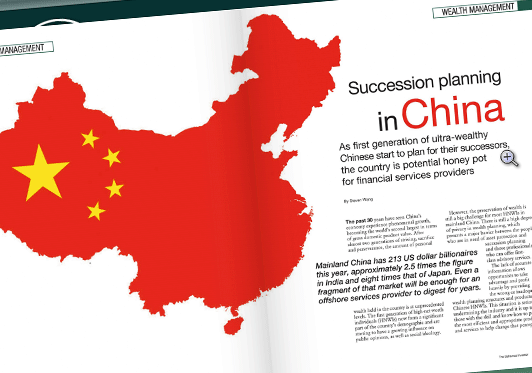| Published: Date: Updated: Author: |
The Bahamas Investor Magazine July 23, 2015 July 23, 2015 Steven Wang |
The past 30 years have seen China’s economy experience phenomenal growth, becoming the world’s second largest in terms of gross domestic product value. After almost two generations of striving, sacrifice and perseverance, the amount of personal wealth held in the country is at unprecedented levels. The first generation of high-net-worth individuals (HNWIs) now form a significant part of the country’s demographic and are starting to have a growing influence on public opinions, as well as social ideology.
Click here to read or browse this feature using Turn-Page/Ezine mode.
However, the preservation of wealth is still a big challenge for most HNWIs in mainland China. There is still a high degree of privacy in wealth planning, which presents a major barrier between the people who are in need of asset protection and succession planning and those professionals who can offer first- class advisory services.
The lack of accurate information allows opportunists to take advantage and profit heavily by providing the wrong or inadequate wealth planning structures and products to Chinese HNWIs. This situation is seriously undermining the industry and it is up to those with the skill and know-how to provide the most efficient and appropriate products and services to help change that perception.
Emerging market potential
As a potential market for international financial centres (IFCs), China has some typical characteristics of emerging markets: demanding clients; a strong stream of emigration to developed countries; a fragmented market; a youthful and growing client base; a lack of professional advisors; weak distribution channels; and a rapidly changing market environment.
This presents offshore jurisdictions with plenty of opportunities, which their service providers cannot afford to ignore. According to Forbes, mainland China has 213 US dollar billionaires this year, approximately 2.5 times the figure in India and eight times that of Japan. Even a fragment of that market will be enough for an offshore services provider to digest for years. The question is, how to get that fragment?
In the past few decades, we have seen quite a few offshore services providers and some IFCs come to China to promote their services and jurisdictions. Some have achieved success; some are still plugging away. Here are some observations that may help financial services providers capitalize on the continually expanding wealth planning market in China. However, these are only observations and other strategies may also
prove successful:
1. Increase your brand awareness in China
People can be born rich; they are not, however, born with a comprehensive knowledge of the offshore world. Sure, rich people take holidays in offshore jurisdictions every year and this can present a tremendous opportunity, but it is not always feasible and it may not lead them to invest their money in that country.
Before HNWIs can evaluate the professionalism of any jurisdiction and its service providers, they need to know the brand first. We have seen some promotional campaigns such as advertisements on the subway in Beijing, endorsements by high-profile celebrities and road shows of seminars in different cities around the country. Campaigns such as these help raise awareness and educate people about the jurisdiction, a precondition for any discussion of professional details.
2. Associate your brand with long-term commitment
By definition, succession planning is a long-term arrangement. It will cover at least two generations, a period most likely lasting decades. “I came; I saw; I conquered” may not be the right attitude of a new player who is entering the market. When a HNWI decides to transfer the legal title of his assets to an offshore trustee registered on an island thousands of miles from his domicile, it is a reasonable expectation that the trustee will commit to the arrangement for the long-term or even forever.
Considering the lack of professionals in an emerging market, some experienced offshore services providers may be tempted to squeeze the last drops of money from a HNWI. It is a risky strategy that can easily lead to the ruin of their reputation in the Chinese market.
3. Minimize the “discount of professionalism”
“Discount of professionalism” is a term I coined to describe the unfortunate misunderstanding and miscommunication due to different languages and cultural backgrounds between offshore services providers and onshore HNWIs in China.
There are many wonderful English brochures, pamphlets and slideshows, but with inaccurate, inexplicable and sometimes even funny Chinese versions. A first-class slide show prepared by a first-class offshore law firm, but translated by a third-class translator into simplified Chinese gives a third-class image in mainland China. If you really need to cut the budget, try travelling in economy class, not by finding a cheap translator.
4. Domestic trusts vs offshore trusts
Traditionally, the domestic trusts under China Trust Law are not used for wealth planning and succession planning. However, to meet the requirements for wealth planning in mainland China, we have seen some developments of Domestic Family Trusts under China Trust Law in the past few years. With the uncertainty of legislation and precedents, the Domestic Family Trusts concept has been created and promoted to HNWIs in China. This is a highly controversial topic in mainland China at the moment. Some financial institutions in mainland China support this concept, while the others take a relatively conservative approach. How to understand and analyse the Domestic Family Trusts structure, identify its differences with offshore trusts and find a right position for an offshore jurisdiction and its services providers is an important and urgent task for anyone who would like to talk to a Chinese HNWI about succession planning.










